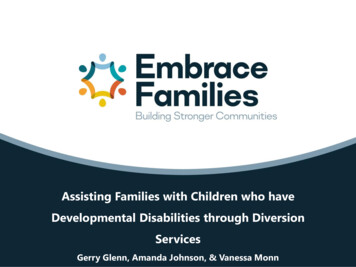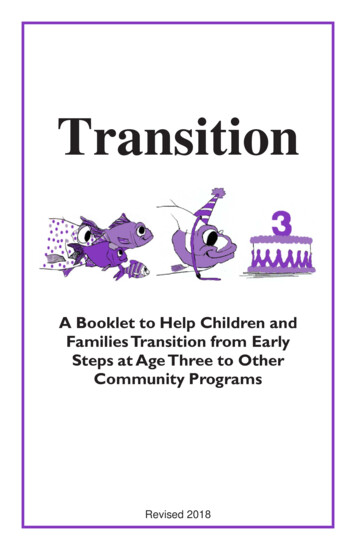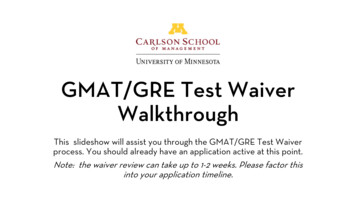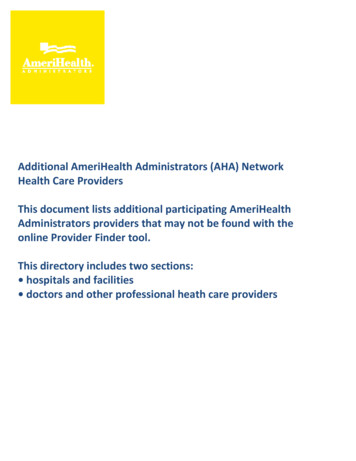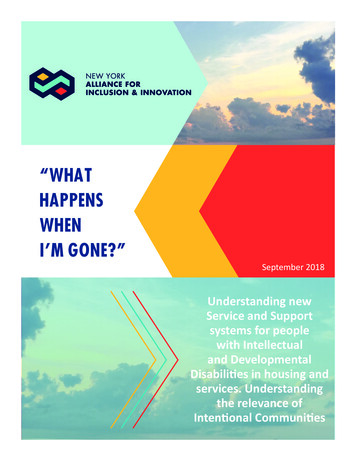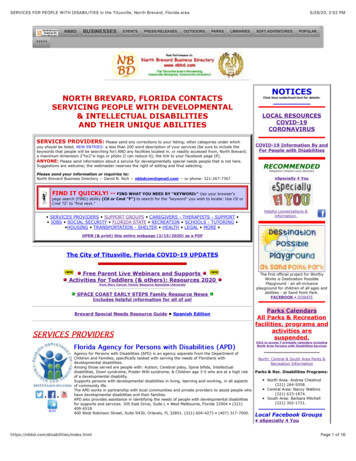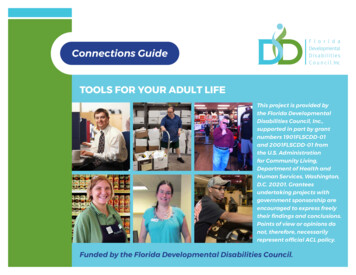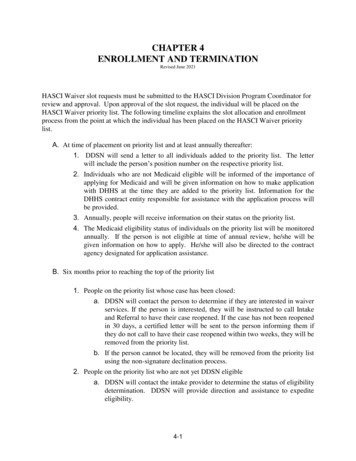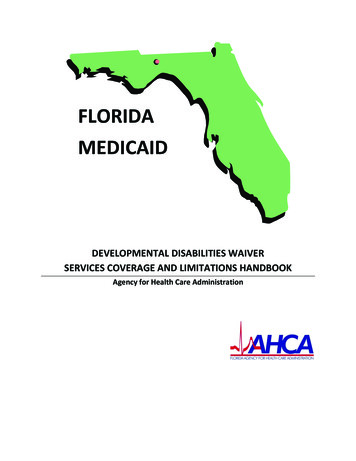
Transcription
FLORIDAMEDICAIDDEVELOPMENTAL DISABILITIES WAIVERSERVICES COVERAGE AND LIMITATIONS HANDBOOKAgency for Health Care Administration
Developmental Disabilities Waiver Services Coverage and Limitations HandbookMay 2010
Developmental Disabilities Waiver Services Coverage and Limitations HandbookUPDATE LOGDEVELOPMENTAL DISABILITIES WAIVERSERVICES COVERAGE AND LIMITATIONS HANDBOOKHow to Use the Update LogIntroductionThe current Medicaid provider handbooks are posted on the Medicaid fiscal agent’s Web site atwww.mymedicaid-florida.com. Select Public Information for Providers, then on ProviderSupport, and then on Provider Handbooks. Changes to a handbook are issued as handbookupdates. An update can be a change, addition, or correction to policy. An update may be issuedas a revised handbook or a completely new handbook.It is the provider’s responsibility to follow correct policy to obtain Medicaid reimbursement.Explanation of the Update LogProviders can use the update log to determine if they have received all the updates to thehandbook.Update describes the change that was made.Effective Date is the date that the update is effective.InstructionsWhen a handbook is updated, the provider will be notified by a postcard or notice. Thenotification instructs the provider to obtain the updated handbook from the Medicaid fiscalagent’s Web site at www.mymedicaid-florida.com. Select Public Information for Providers, thenon Provider Support, and then on Provider Handbooks.Providers who are unable to obtain an updated handbook from the Web site may request apaper copy from the Medicaid fiscal agent’s Provider Support Contact Center at 1-800-289-7799.May 2010
Developmental Disabilities Waiver Services Coverage and Limitations HandbookMay 2010
Developmental Disabilities Waiver Services Coverage and Limitations HandbookDEVELOPMENTAL DISABILITIES WAIVER SERVICESCOVERAGE AND LIMITATIONS HANDBOOKTable of ContentsChapter and Topic .PageIntroduction To The HandbookHandbook Use and Format . iCharacteristics of the Handbook . iiHandbook Updates . iiiChapter 1 – Purpose, Definitions, and Provider QualificationsGeneral Definitions . 1-2Description and Purpose . 1-8Provider Qualifications and Responsibilities. 1-10Adult Day Training Provider Requirements . 1-15Adult Dental Services Provider Requirements . 1-16Behavioral Analysis Provider Requirements . 1-16Behavioral Assistant Services Provider Requirements . 1-17Companion Provider Requirements . 1-18Consumable Medical Supplies Provider Requirements . 1-19Dietitian Provider Requirements . 1-19Durable Medical Equipment Provider Requirements . 1-20Environmental Accessibility Adaptation Provider Requirements . 1-20In-Home Support Services Provider Requirements . 1-21Medication Review Provider Requirements . 1-22Occupational Therapy Provider Requirements. 1-22Personal Care Assistance Provider Requirements . 1-22Personal Emergency Response (PERS) Provider Requirements . 1-23Physical Therapy Provider Requirements . 1-23Private Duty Nursing Provider Qualifications . 1-24Residential Habilitation Provider Requirements . 1-25Residential Nursing Services Provider Requirements . 1-27Respiratory Therapy Provider Requirements . 1-27Respite Care Services Provider Requirements . 1-28Skilled Nursing Services Provider Requirements . 1-28Specialized Medical Home Care Provider Requirements . 1-29Specialized Mental Health Services Provider Requirements . 1-29Speech Therapy Provider Requirements . 1-30May 2010
Developmental Disabilities Waiver Services Coverage and Limitations HandbookSupport Coordination Provider Requirements . 1-30Supported Employment Services Provider Requirements . 1-33Supported Living Coaching Services Provider Requirements . 1-34Transportation Services Provider Requirements . 1-35Chapter 2 - Covered Services, Limitations, and ExclusionsRequirements To Receive Services . 2-2Documentation Requirements . 2-6Definitions . 2-8Adult Day Training. 2-13Adult Dental Services . 2-19Behavior Analysis Services . 2-20Behavior Assistant Services . 2-23Companion Services . 2-25Consumable Medical Supplies . 2-27Dietitian Services . 2-30Durable Medical Equipment and Supplies . 2-32Environmental Accessibility Adaptations . 2-39In-Home Support Services . 2-44Occupational Therapy . 2-47Personal Care Assistance . 2-49Personal Emergency Response Systems. 2-52Physical Therapy. 2-53Private Duty Nursing . 2-55Residential Habilitation Services . 2-57Residential Nursing Services . 2-68Respiratory Therapy. 2-70Respite Care . 2-71Skilled Nursing . 2-73Special Medical Home Care . 2-75Specialized Mental Health Services . 2-76Chapter 2 - Covered Services, Limitations, and Exclusions, continuedSpeech Therapy . 2-78Support Coordination . 2-80Supported Employment. 2-92Supported Living Coaching . 2-98Transportation . 2-102Chapter 3 – Procedure Codes and Reimbursement InformationReimbursement Information . 3-1Procedure Code Modifier . 3-4AppendicesAppendix A: Core Assurances for Providers of Developmental DisabilitiesHome and Community-Based Waiver Services Program . A-1Appendix B: Area Offices for the Agency for Persons with Disabilities . B-1Appendix C: Waiver Eligibility Determination . .C-1Appendix D: Medicaid Waiver Service Agreement .D-1May 2010
Developmental Disabilities Waiver Services Coverage and Limitations HandbookINTRODUCTION TO THE HANDBOOKOverviewIntroductionThis chapter introduces the format used for the Florida Medicaid handbooks and tells thereader how to use the handbooks.BackgroundThere are three types of Florida Medicaid handbooks:Provider General Handbook describes the Florida Medicaid Program.Coverage and Limitations Handbooks explain covered services, their limits, who iseligible to receive them, and the fee schedules.Reimbursement Handbooks describe how to complete and file claims for reimbursementfrom Medicaid.Exceptions: For Prescribed Drugs and Transportation Services, the coverage andlimitations handbook and the reimbursement handbook are combined into one.Legal AuthorityThe following federal and state laws govern Florida Medicaid:Title XIX of the Social Security Act,Title 42 of the Code of Federal Regulations,Chapter 409, Florida Statutes, andChapter 59G, Florida Administrative Code.The specific Federal Regulations, Florida Statutes, and the Florida Administrative Code,for each Medicaid service are cited for reference in each service-specific coverage andlimitations handbook.In This ChapterTOPICPAGEHandbook Use and FormatCharacteristics of the HandbookHandbook UpdatesiiiiiiHandbook Use and FormatPurposeThe purpose of the Medicaid handbooks is to furnish the Medicaid provider with thepolicies and procedures needed to receive reimbursement for covered services providedto eligible Florida Medicaid recipients.May 2010
Developmental Disabilities Waiver Services Coverage and Limitations HandbookThe handbooks provide descriptions and instructions on how and when to completeforms, letters or other documentation.ProviderThe term ―provider‖ is used to describe any entity, facility, person or group who isenrolled in the Medicaid program and renders services to Medicaid recipients and billsMedicaid for services.RecipientThe term ―recipient‖ is used to describe an individual who is eligible for Medicaid.General HandbookGeneral information for providers regarding the Florida Medicaid Program, recipienteligibility, provider enrollment, fraud and abuse policy, and important resources areincluded in the Florida Medicaid Provider General Handbook.Coverage and Limitations HandbookEach coverage and limitations handbook is named for the service it describes. Aprovider who furnishes more than one type of service will have more than one coverageand limitations handbook.Reimbursement HandbookEach reimbursement handbook is named for the claim form that it describes.Chapter NumbersThe chapter number appears as the first digit before the page number at the bottom ofeach page.Page NumbersPages are numbered consecutively throughout the handbook. Page numbers follow thechapter number at the bottom of each page.White SpaceThe "white space" found throughout a handbook enhances readability and allows spacefor writing notes.Characteristics of the HandbookFormatThe format styles used in the handbooks represent a concise and consistent way ofdisplaying complex, technical material.Information BlockInformation blocks replace the traditional paragraph and may consist of one or moreparagraphs about a portion of the subject. Each block is identified or named with alabel.LabelLabels or names are located in the left margin of each information block. They identifythe content of the block in order to facilitate scanning and locating information quickly.May 2010
Developmental Disabilities Waiver Services Coverage and Limitations HandbookNoteNote: is used most frequently to refer the user to pertinent material located elsewhere inthe handbook.Note: also refers the user to other documents or policies contained in other handbooks.Topic RosterEach chapter contains a topic roster on the first page which serves as a table ofcontents for the chapter, listing the subjects and the page number where the subjectcan be found.Handbook UpdatesUpdate LogThe first page of each handbook will contain the update log.Every update will contain a new updated log page with the most recent updateinformation added to the log.Each update will be designated by an ―Update‖ and the ―Effective Date.‖How Changes Are UpdatedThe Medicaid handbooks will be updated as needed. Changes may consist of one ofthe following:1.Replacement handbook—Major changes will result in the entire handbook beingreplaced with a new effective date throughout and it will be a clean copy.2.Revised handbook – Changes will be highlighted in yellow and will beincorporated within the appropriate chapter. These revisions will have aneffective date that corresponds to the effective date of the revised handbook.Effective Date of New MaterialThe month and year that the new material is effective will appear in the center of eachpage. The provider can check this date to ensure that the material being used is themost current and up to date.Identifying New InformationNew material will be indicated by yellow highlighting. The following information blocksgive examples of how new labels, new information blocks, and new or changed materialwithin an information block will be indicated.New Label and New Information BlockA new label and a new information block will be identified with yellow highlight to theentire section.New Material in an Existing Information Block or ParagraphNew or changed material within an existing information block or paragraph will beidentified by yellow highlighting to the sentence or paragraph affected by the change.May 2010
Developmental Disabilities Waiver Services Coverage and Limitations HandbookCHAPTER 1DEVELOPMENTAL DISABILITIES WAIVER SERVICESPURPOSE, DEFINITIONS, AND PROVIDER QUALIFICATIONSOverviewIntroductionThis chapter describes the Medicaid Developmental Disabilities (DD) Waiver Program,specifies the authority regulating DD waiver services, the purpose of the program,provider qualifications and responsibilities. DD Waiver refers to all four DD Waivers(Tiers One, Two, Three, and Four).Legal AuthorityMedicaid home and community-based services (HCBS) waiver programs are authorizedunder section 1915(c) of the Social Security Act and governed by Title 42, Code ofFederal Regulations (C.F.R.), Parts 440 and 441.Section 409.906, Florida Statutes (F.S.) and Chapter 59G, Florida Administrative Code(F.A.C.), authorize the Florida Medicaid DD waiver.Specific statutory authority for the promulgation of the Florida Medicaid DevelopmentalDisabilities Waiver Services Handbook into rule is found in the following provisions oflaw: sections 408.302 and 409.919, F.S.The Agency for Health Care Administration (AHCA) has final authority on all policies,procedures, rules, regulations, manuals, and handbooks pertaining to the waiver. TheAgency for Persons with Disabilities (APD) is authorized by AHCA to operate and overseethe waiver in accordance with the Interagency Agreement for Medicaid between AHCAand APD regarding the Developmental Disabilities Home and Community-Based Services(DD) Waiver.In This ChapterMay 2010TOPICPAGEGeneral DefinitionsDescription and PurposeProvider Qualifications and Responsibilities1-21-81-151-1
Developmental Disabilities Waiver Services Coverage and Limitations HandbookGeneral DefinitionsAHCAThe Agency for Health Care Administration (AHCA).Agency or Group ProviderA business or organization enrolled to provide a waiver service(s) that has one or morestaff employed to carry out the enrolled service(s). An agency or group provider for ratepurposes is a provider that hires staff to perform the waiver services. The agency rate isused for all services that are directly provided by employees of the provider. Allemployees of an agency or group provider must meet the qualifications andrequirements specified in the provider’s agreement and those specified for enrolledservice(s). The provider shall maintain personnel file documenting qualifications of allemployees and their background screening results.APDThe Agency for Persons with Disabilities (APD).Area OfficeAPD’s local office responsible for managing one of APD’s 14 service areas.Note: See Appendix B for APD contact information.Core AssurancesThe document that specifies administrative and programmatic requirements for DDwaiver providers. The Core Assurances and the specific service requirements publishedin this handbook are incorporated into the Medicaid Waiver Services Agreement byreference, and provide the terms and conditions by which the provider of DD waiverservices to recipients with developmental disabilities served by APD agrees to be bound.Note: See Appendix A for additional information on Core Assurances.Direct Provider BillingThis is a standard billing process for Developmental Disabilities Medicaid Waiver serviceproviders.All claims for DD waiver services must be submitted either on paper Non-Institutional081 claim forms or electronically directly to the Medicaid fiscal agent.Effective July 1, 2008, the Non-Institutional 081 claim form will be replaced by the CMS1500 claim form.May 20101-2
Developmental Disabilities Waiver Services Coverage and Limitations HandbookInstructions for completing the Non-Institutional 081 claim form are in the FloridaMedicaid Provider Reimbursement Handbook, Non-Institutional 081. Instructions forcompleting the CMS-1500 claim form are in the Florida Medicaid ProviderReimbursement Handbook, CMS-1500.Note: The handbooks are available on the Medicaid fiscal agent’s Web site atwww.mymedicaid-florida.com. Select the Public Information for Providers, thenProvider Support, and then Provider Handbooks. The Non-Institutional 081 claim formand Florida Medicaid Provider Reimbursement Handbook, Non-Institutional 081, areincorporated by reference in 59G-13.001. The CMS-1500 claim form and the FloridaMedicaid Provider Reimbursement Handbook, CMS-1500, are incorporated by referencein 59G-4.001, F.A.C.Direct Service ProviderAs defined in section 393.063, F.S., a “direct service provider” means a person 18 yearsof age or older who has direct face-to-face contact with a recipient or has access to arecipient’s living areas or to a recipient’s funds or personal property.FMMISThe Florida Medicaid Management Information System managed by AHCA.Health Insurance Portability and Accountability Act (HIPAA)The Health Insurance Portability and Accountability Act of 1996 (HIPAA) makes healthinsurance more “portable” so that workers may take their health insurance with themwhen they moved from one job to another, without losing health coverage. This federallegislation also requires the health care industry to adopt uniform codes and forms,streamlining the processing and use of health data and claims which will serve to betterprotect the privacy of people’s health care information and give them greater access tothat information.Independent VendorA service provider who meets specified qualifications or holds local occupationallicenses.Job DevelopmentMeans the process of developing employer relations and linking recipients with privateand public sector labor needs. This process involves exploring job skills and jobpreferences with the recipient with a disability, as well as networking with the recipientwith a disability, the job developer or job coach, other people who know the recipientseeking employment, and local employers.May 20101-3
Developmental Disabilities Waiver Services Coverage and Limitations HandbookLicensed Residential FacilityFacilities providing room and board, and other services in accordance with the licensingrequirements for the facility type. Community-based recipients with developmentaldisabilities may receive DD waiver services while residing in: Group homes and foster care homes licensed in accordance with Chapter 393,F.S. and Chapter 409, F.S.Comprehensive Transitional Education Programs (CTEPs) licensed in accordancewith Chapter 393, F.S.Assisted Living Facilities, and Transitional Living Facilities, licensed in accordancewith Chapters 400 and 429, F.S.Residential Habilitation Centers, licensed in accordance with Chapter 393, F.S.,and any other type of licensed facility not mentioned above, having a capacity of16 or more persons, if the recipient has continuously resided at the facility sinceAugust 8, 2001 or prior to this date.Meaningful Day ActivitiesChoices made by recipients of how to use their time in order to provide direction,purpose and quality to the individual recipient’s daily life. The recipient’s choice ofmeaningful day activities must be based on his interests, skills and talents. Meaningfulday activities may involve choices that are not paid for by the waiver, including paidemployment, volunteer work and school. Meaningful day activities that are paid forunder the waiver are limited to 30 hours per week, and include supported employment,adult day training, and companion. A recipient may choose a mix of meaningful dayactivities, but under no circumstances will the waiver pay for more than 30 hours aweek of meaningful day activities for each recipient. Chosen activities must directlyaddress identified goals in the recipient’s support plan.Medicaid State Plan ServicesThe Medicaid State Plan is Florida Medicaid’s contract with the Centers for Medicareand Medicaid that specifies the eligibility categories of low income people and themedical services that Florida Medicaid provides. Medicaid is different in every state. InFlorida, the Agency for Health Care Administration (AHCA) develops and carries outpolicies related to the Medicaid program.Florida’s state plan services are authorized by s.409.905 and 409.906, F.S. Generalinformation about Florida Medicaid is available on AHCA’s Web site atwww.www.ahca.myflorida.com. Select Medicaid. Detailed descriptions of the servicesare available in the Florida Medicaid Coverage and Limitations Handbooks.May 20101-4
Developmental Disabilities Waiver Services Coverage and Limitations HandbookNote: The Medicaid Coverage and Limitations Handbooks are available on the Medicaidfiscal agent’s Web site at www.mymedicaid-florida.com. Select Public Information forProviders, then Provider Support, and then Provider Handbooks. The Coverage andLimitations Handbooks are incorporated by reference in rule 59G-4, F.A.C.Medicaid Waiver Services AgreementThe Medicaid Waiver Services Agreement means the contract between the Agency forPersons with Disabilities and providers of waiver services. All providers must completethis agreement prior to providing services to recipients enrolled in the DD WaiverProgram and comply with the terms and conditions of the agreement. Modifications oradditions may be made by APD to the sample agreement provided on a case-by-casebasis as necessary to address specific facts or other concerns relevant to an individualprovider. An example of the Medicaid Waiver Services Agreement is included asAppendix D.Medical Case Management TeamThe health and safety oversight team designated by the APD Area Office as the servicearea Medical Case Management Team (MCMT). At a minimum, the MCMT will have onefull time or full time equivalency registered nurse who will be the Medical CaseManager. Tasks of the MCMT include: Review of recipient needs;Review of health related supports and services that a recipient is receiving andthe recipient’s response to them;Follow-up concerning an illness, injury, or accident; andConsultation, technical assistance and training with support coordinators,service providers, and medical specialists regarding a recipient’s care.Medical Necessity or Medically NecessaryA set of conditions established by the Agency for Health Care Administration, fordetermining the need for and appropriateness of Medicaid -funded services for anenrolled recipient.As defined in rule 59G-1.010(166) , F.A.C., as it relates to medical necessity or medicallynecessary, the medical or allied care, goods, or services furnished or ordered as definedas meeting the following conditions: Be necessary to protect life, to prevent significant illness or significant disability,or to alleviate severe pain; Be individualized, specific, and consistent with symptoms or confirmeddiagnosis of the illness or injury under treatment, and not in excess of thepatient’s needs;May 20101-5
Developmental Disabilities Waiver Services Coverage and Limitations Handbook Be consistent with generally accepted professional medical standards as definedby the Medicaid program and not be experimental or investigational;Be reflective of the level of service that can be safely furnished, for which noequally effective and more conservative or less costly treatment is available,statewide; andBe furnished in a manner not primarily intended for the convenience of therecipient, the recipient’s caretaker, or the provider.Provider Service AgreementPrior to providing any services the provider must in order to be compensated for waiverservices execute a Medicaid Provider Agreement with the Agency for Health CareAdministration, and be issued a Medicaid provider number by the Medicaid fiscal agent.The provider must, at all times, maintain a current and valid Medicaid ProviderAgreement with AHCA and must comply with the terms and conditions of the MedicaidProvider Agreement as fully set forth within the agreement.ResidenceThe place in which a recipient resides for an extended or a permanent period of timeand is considered his home.Service AuthorizationAn APD document that the waiver support coordinator sends to a waiver providerauthorizing the provision of specific services or supports to a recipient. Without serviceauthorization, the provider is not authorized to provide the service and cannot submit aclaim nor be reimbursed for the service. For the purposes of direct provider billing, theservice authorization must contain the waiver support coordinator’s 9-digit treatingprovider number. Services provided without authorization are subject to recoupment offunds from the service provider. Support coordinators must ensure serviceauthorizations are provided in writing.Authorizing a service at a rate or frequency that is higher than that approved by APD willresult in the waiver support coordinator being subject to recoupment of funds forsupport coordination services and recoupment of service dollars billed without properauthorization. This authorization is contingent upon the enrolled recipient remainingeligible for Medicaid during the month of service. Upon a recipient’s loss of Medicaideligibility, the service authorization is null and void. In this instance, the provider mustcontact the waiver support coordinator or APD to ascertain if alternative funding isavailable for the services.May 20101-6
Developmental Disabilities Waiver Services Coverage and Limitations HandbookSolo ProviderA solo or independent provider who personally renders waiver services directly torecipients and does not employ others to render waiver services for which the rate isbeing paid. For example: If the provider is a solo provider and incorporates, theprovider is still
The Agency for Health Care Administration (AHCA) has final authority on all policies, procedures, rules, regulations, manuals, and handbooks pertaining to the waiver. The Agency for Persons with Disabilities (APD) is authorized by AHCA to operate and oversee the waiver in accordance
